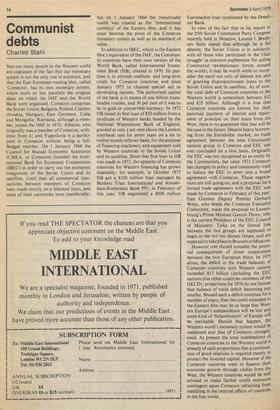Communist debts
Charles Stahl
Not too many people in the Western world are cognisant of the fact that our monetary system is not the only one in existence, and that the East European trading bloc, called 'Comecon', has its own monetary system, which more or less parallels the original ideas on which the IMF and the World Bank were organised. Comecon comprises the Soviet Union, Bulgaria, Poland, Czecho- slovakia, Hungary, East Germany, Cuba and Mongolia; Rumania, although a mem- ber, joined the IMF in 1972; Albania, who originally was a member of Comecon, with- drew from it; and Yugoslavia is a partici- pant in Comecon without being a full- fledged member. On 1 January 1964 the Council for Mutual Economic Assistance (CM EA, or Comecon) founded the Inter- national Bank for Economic Cooperation (IBEC) in order to carry out the economic integration of the Soviet Union and its satellites. Until then all commercial tran- sactions between members of Comecon were made strictly on a bilateral basis, and none of their currencies were transferable; but on 1 January 1964 the transferable rouble was created as the 'international currency' of the Eastern bloc, and it has since become the pivot of the Comecon monetary system as well as its standard of value.
In addition to IBEC, which is the Eastern bloc's equivalent of the IMF, the Commun- ist countries have their own version of the World Bank, called International Invest- ment Bank (IIB), created in 1970. Its pur- pose is to provide medium- and long-term credit for Comecon countries and since January 1975 to channel special aid to developing nations. The authorised capital of the bank is in excess of one billion trans- ferable roubles, and 30 per cent of it was to be in gold or convertible currency. In 1973 11B raised its first loan of S50 million from a syndicate of Western banks headed by the National Westminster Bank of England, granted at only 1 per cent above the London interbank rate for seven years on a six to twelve month rollover basis, for the purpose of financing machinery and equipment sold by Western countries to the Soviet Union and its satellites. Since that first loan to IIB was made in 1973, the appetite of Comecon countries for Western financing has grown insatiably; for example, in October 1975 IIB got a $350 million loan managed by Bankers Trust International and Amster- dam-Rotterdam Bank NV; in February of this year, IIB negotiated a $500 million Euromarket loan syndicated by the Dresd- ner Bank.
In view of the fact that in his report to the 25th Soviet Communist Party Congress recently held in Moscow, Leonid I. Brezh- nev flatly stated that although he is for détente, the Soviet Union is in solidarity with all those who participate in the 'class struggle' (a common euphemism for aiding Communist revolutionary forces around the world), it may be worth while to recon- sider the merit not only of détente but also of granting disproportionate loans to the Soviet Union and its satellites. As of now, the total debt of Comecon countries to the Western world is somewhere between $32 and $35 billion. Although it is true that Comecon countries are known for their punctual payment of interest and repay- ment of principal on their loans from the West, there is no guarantee that that will be the case in the future. Despite heavy borrow- ing from the Eurodollar market, no trade agreement between the nine Communist nations group in Comecon and EEC was ever concluded on a bloc basis. Originally the EEC was not recognised as an entity by the Communists, but since 1973 Comecon has changed its policy and consistently tried to induce the EEC to enter into a broad agreement with Comecon. Those negotia- tions are still going on, and a proposal for a formal trade agreement with the EEC was made by Comecon in February of this year. East German Deputy Premier Gerhard Weiss, who heads the Comecon Executive Committee, made the proposal to Luxem- bourg's Prime Minister Gaston Thorn, who is the current President of the EEC Council of Ministers. Talks on the formal link between the two groups are supposed to begin in the not too distant future, and are expected to take place in Brussels or Moscow.
However one should consider the poten- tial consequences of closer cooperation between the two European blocs. In 1975 alone, the deficit in the trade balances of Comecon countries with Western nations exceeded $12 billion (including the EEC nations plus other countries members of the OECD); projections for 1976 do not foresee that balance of trade deficit becoming any smaller. Should such a deficit continue for a number of years, then the credit extended to the Eastern bloc may be so large that West- ern Europe's independence will be lost and some kind of 'finlandisation' of Europe will be inevitable. Should that happen, the Western world's monetary system would be weakened and that of Comecon strength- ened. At present the total indebtedness of Comecon countries to the Western world is already of such proportions that a continua- tion of good relations is required merely to protect the invested capital. However if the Comecon countries want to finance their economic growth through credits from the West, the Western countries would be well advised to make further credit extension contingent upon Comecon refraining from meddling in the internal affairs of countries in the free world.


































 Previous page
Previous page